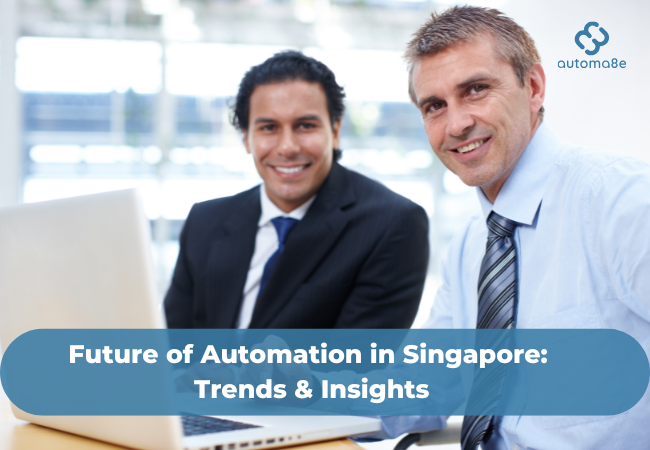Singapore has long been at the forefront of technological advancements, positioning itself as a global hub for innovation and automation. As industries evolve, automation is no longer just a trend—it is a necessity. From artificial intelligence (AI) to robotic process automation (RPA), Singapore’s businesses are rapidly integrating smart solutions to improve efficiency, reduce costs, and enhance customer experiences.
With a strong digital infrastructure and a highly skilled workforce, Singapore provides the ideal environment for automation to thrive. Government policies, tax incentives, and strategic investments in AI and machine learning further accelerate automation adoption across multiple sectors.
In this blog, we’ll explore:
- Future of Automation: Insights from Singapore
- The Rise of Automation in Singapore
- Key Industries Driving Automation
- Government Initiatives and Support
- Challenges and Considerations
- Automa8e: Transforming Business Automation in Singapore
- The Future of Automation in Singapore
Key Industries Driving Automation
Several key industries in Singapore are embracing automation to redefine their operational models:
- Manufacturing: The adoption of smart factories, robotics, and IoT-enabled machines has transformed production lines, ensuring higher efficiency, precision, and quality control. Technologies like 3D printing and automated assembly lines are also reducing material waste and enhancing productivity.
- Finance & Accounting: AI-driven financial automation platforms are streamlining tax computations, invoice processing, and compliance management. Automated reconciliation systems are reducing human errors and ensuring real-time financial tracking.
- Healthcare: Robotic-assisted surgeries, AI-driven diagnostics, and automated patient management systems are improving healthcare services. AI chatbots and virtual health assistants provide 24/7 patient support, reducing administrative burden on healthcare professionals.
- Retail & E-Commerce: Automated supply chains, AI-powered customer support, and predictive analytics are reshaping consumer experiences. With automation, retailers can optimize inventory management, personalize customer interactions, and enhance demand forecasting.
- Corporate & Compliance Services: Businesses are leveraging automation for regulatory compliance, corporate secretarial tasks, and financial reporting. AI-powered solutions help ensure accuracy in legal documentation and corporate governance.

Government Initiatives and Support
The Singaporean government has been actively supporting automation through initiatives such as the Smart Nation Initiative and the Industry Transformation Maps (ITMs). These efforts aim to foster innovation and encourage businesses to integrate automation into their operations.
Key government grants and support programs include:
- Productivity Solutions Grant (PSG): Provides subsidies for businesses adopting pre-approved digital and automation solutions.
- Enterprise Development Grant (EDG): Supports companies investing in automation and business transformation strategies.
- AI Singapore Initiative: Aims to accelerate AI adoption across industries, with funding and mentorship opportunities.
- Workforce Upskilling Programs: Training initiatives and courses help employees transition into more strategic roles as automation takes over repetitive tasks.

Challenges and Considerations
Despite the advantages, automation comes with its challenges:
- Workforce Adaptation: The transition to automation requires upskilling employees to work alongside AI and automated systems. Companies must invest in reskilling programs to ensure a smooth transition.
- Initial Investment Costs: While automation leads to long-term cost savings, the initial investment can be substantial for SMEs. Businesses must carefully evaluate ROI before implementing automation solutions.
- Cybersecurity Risks: With increased reliance on digital systems, businesses must prioritize cybersecurity to protect sensitive data. Cyber threats and data breaches can pose significant risks if not managed properly.
- Integration Complexity: Many businesses struggle with integrating new automation tools with their existing legacy systems. A well-planned digital transformation strategy is essential for seamless integration.
Automa8e: Transforming Business Automation in Singapore
For businesses looking to embrace automation seamlessly, Automa8e provides AI-powered solutions designed to optimize accounting, tax management, compliance, and corporate operations. Automa8e’s intuitive platform automates essential business functions, allowing companies to focus on growth and innovation.
With features such as automated financial reporting, AI-driven compliance tracking, and real-time analytics, Automa8e helps businesses enhance efficiency, improve accuracy, and reduce manual workloads. By integrating Automa8e’s solutions, companies can future-proof their operations and gain a competitive edge in the evolving market.

The Future of Automation in Singapore
As automation continues to advance, Singapore is set to become a global leader in AI-driven solutions. Businesses that invest in automation today will not only enhance efficiency but also stay ahead of industry competition.
Future trends in automation include:
- Hyper automation: Combining AI, machine learning, and robotic process automation (RPA) to create end-to-end business automation.
- AI-Powered Decision Making: Businesses will increasingly rely on AI-driven insights to make strategic decisions, optimize workflows, and identify market trends.
- Human and AI Collaboration: The future of work will focus on AI augmenting human decision-making rather than replacing jobs entirely. Employees will take on more strategic and creative roles.
With platforms like Automa8e, companies can navigate the evolving landscape with cutting-edge solutions tailored to their needs, ensuring long-term success in the digital age.
FAQs About Future of Automation in Singapore
The future of automation in Singapore is promising, with AI, robotics, and process automation driving efficiency across industries. Businesses are rapidly adopting smart solutions to enhance productivity and reduce costs.
Key industries embracing automation include manufacturing, finance, healthcare, retail, and corporate compliance. These sectors are using AI and robotics to streamline operations and improve service delivery.
The Singapore government offers grants like the Productivity Solutions Grant (PSG) and the Enterprise Development Grant (EDG) to help businesses implement automation solutions and enhance digital transformation.
Challenges include workforce adaptation, high initial investment costs, cybersecurity risks, and integration complexities with legacy systems. Businesses need a well-planned strategy for a smooth transition.
Automa8e provides AI-powered solutions for accounting, tax management, compliance, and business operations. It automates essential processes, helping businesses improve efficiency and focus on growth.
The future of automation in Singapore is promising, with businesses across various sectors leveraging AI, RPA, and intelligent systems to drive efficiency and innovation. With strong government support, technological advancements, and industry-driven automation solutions, Singapore is paving the way for a smarter, more automated future.
